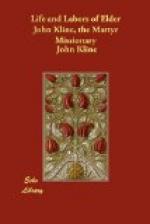Baptism is not the putting away of the filth of the flesh. This is not its legitimate result. Its effect is the answer of a good conscience toward God. When one submits to this ordinance in the right spirit, and it is properly administered, it never fails of being followed by this happy experience. It gives the heart peace and rest in Christ. “The eunuch went on his way rejoicing.” “The jailer rejoiced, believing in God with all his house.” These rejoicings followed baptism in each case. The Psalmist says: “The testimony of the Lord is sure, enlightening the eyes: the statutes of the Lord are pure, rejoicing the heart. More are they to be desired than gold; yea, than much fine gold; for in the keeping of them there is great reward.”
Baptism is both a testimony and a statute. It is a testimony because it bears witness to the truth by the joy it imparts; and it is a statute because it is a written command of God which it is the duty of every believer to obey; and in the keeping of it there is great reward.
FRIDAY, August 27. They had meeting at Henry Hart’s. Acts 3 was read. Two brethren were advanced from the deaconship to the ministry of the Word, and two were elected to the deaconship. The twenty-eighth they spent mostly with Brother John Royer. The twenty-ninth they attended two meetings: one at Brother Joel Royer’s, and the other near the same place. At Joel Royer’s, Brother Isaac Long took the lead in speaking; and from the outlines of his discourse, given in the Diary, I am assured it is worthy of being expanded into a sermon, and of holding a prominent place in this work.
Sermon by Elder Isaac Long, of Virginia.
Preached at Joel Royer’s, in Pennsylvania, August 29.
TEXT.—“A sower went out to sow his seed.”
There is one feature about my text for to-day that is likely to draw at least momentary attention. That feature is its simplicity. I am glad to hope that this may give rise to a query in the mind of each hearer in substance something like this: “What can he have to say on such a simple text as that? I am going to listen and see what he will make of it.” I see your eyes have turned to me now; but, beloved brethren and sisters, whilst the eyes of your bodies are turned to me from feelings of curiosity, I beg that the eyes of your understandings and hearts may be turned to the Lord, for grace, on my part to speak, and on your part to hear.
The text, in its simplicity of phraseology and external sense, looks like a nut without a kernel. It comes to the ear like the uncertain sound of a trumpet: “A sower went out to sow his seed.” No part of the farmer’s work, however, is more common in its seasons than this; and I may add with emphasis, that no part of the farmer’s work in its seasons is more important than this. The life of the world depends upon two great facts—seeding and harvesting; and when the Lord established his covenant with Noah after the flood, two of the essential provisions of that covenant were couched in these words: “While the earth remaineth, seedtime and harvest shall not cease.” I never read that covenant but with delight, because I love farming, and when at home farming is my business. Here is my covenant with the Lord, and my assurance that my seedings will be blessed.




